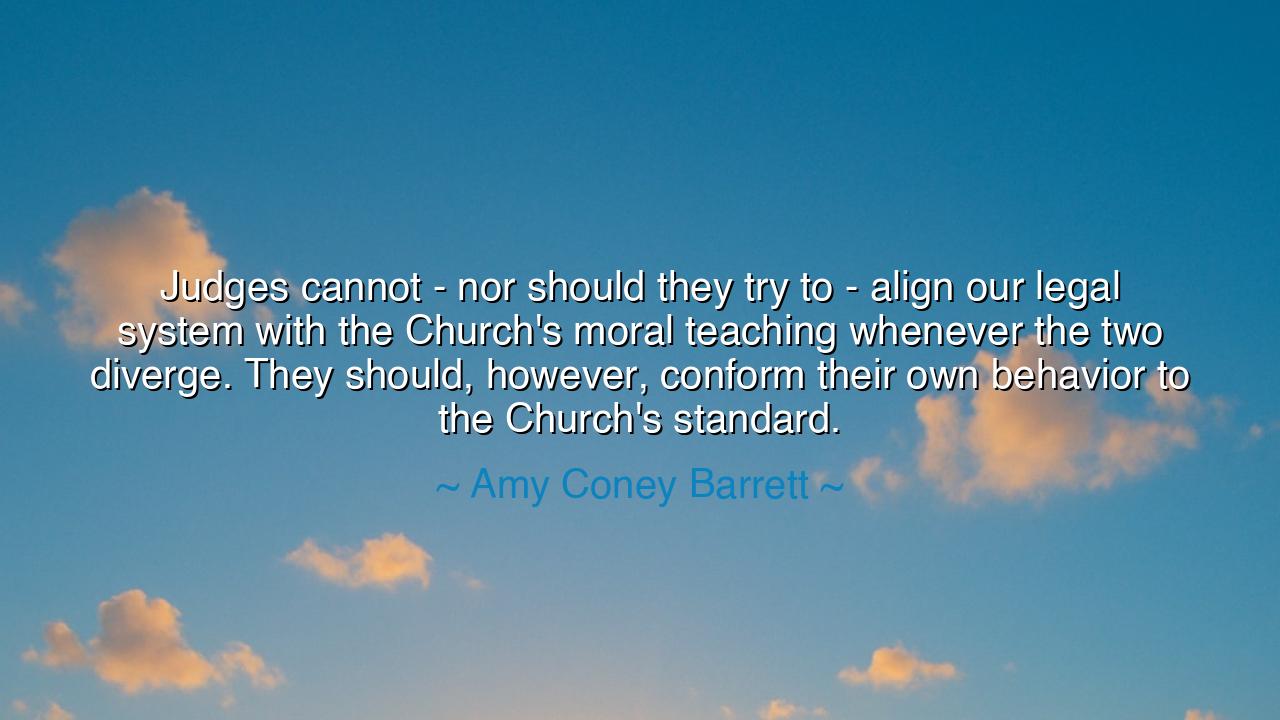
Judges cannot - nor should they try to - align our legal system
Judges cannot - nor should they try to - align our legal system with the Church's moral teaching whenever the two diverge. They should, however, conform their own behavior to the Church's standard.






Hear, O seekers of justice and faith, the words of Amy Coney Barrett: “Judges cannot—nor should they try to—align our legal system with the Church's moral teaching whenever the two diverge. They should, however, conform their own behavior to the Church's standard.” In this saying lies the ancient tension between the law of man and the law of God, between the duty of the magistrate and the duty of the soul. For the law of the republic governs all, binding citizens of many creeds beneath one order, but the law of the spirit governs the individual heart, shaping conduct and conscience. To confuse these is to invite tyranny; to ignore them is to invite corruption.
The ancients too knew this struggle. Consider Antigone, who stood before the throne of Creon. The king commanded one law, but her conscience, bound by a higher duty to the divine, commanded another. She buried her brother, though the law forbade it, declaring that eternal law was greater than the decrees of kings. Yet her story also shows the peril: when divine law and civil law collide without wisdom, tragedy can consume both ruler and ruled. Barrett’s words echo this ancient lesson: judges must not impose the Church’s morality upon the legal system, for the law serves a plural people; yet judges must not neglect their own moral behavior, for they themselves are accountable before God.
Look also to the story of Thomas More, who served as Lord Chancellor of England. He upheld the law of the land, yet when pressed to betray his conscience and swear to the king’s supremacy over the Church, he refused. He did not demand that England’s laws be written to conform to his faith; rather, he chose martyrdom rather than compromise his personal fidelity to God. In his life we see the meaning of Barrett’s counsel: the judge must serve the state with impartiality, but must serve God with personal devotion.
Thus the quote warns us against two great errors. The first is to make the legal system a weapon of one creed, forcing all people, believer and unbeliever alike, to bow before teachings they do not share. Such was the error of theocratic rulers, who in their zeal sought to merge altar and throne, often leading to persecution and war. The second error is to sever personal morality from public duty, leaving judges to drift in the sea of relativism, unanchored by conscience. Barrett calls for the narrow path between these extremes: law for all, conscience for the self.
The meaning of her teaching is that the legal system must remain neutral, a common ground where the diverse citizens of a nation may find order and fairness. Yet the judge’s soul cannot be neutral in the same way, for neutrality of conscience is emptiness. The judge must draw strength from their moral and spiritual foundation, not to twist the law to fit it, but to govern their own integrity, humility, and justice. For the law is cold if not warmed by virtue, and virtue is directionless if not tested against the law.
The lesson for future generations is this: distinguish between what belongs to Caesar and what belongs to God. Do not expect the courts to legislate morality in the image of one tradition alone, for such demands sow division. But do not think that morality is irrelevant to public service, for a judge without virtue will corrupt the law from within. Let each person in authority conform their own behavior to the highest standards of truth, while ensuring the law remains a dwelling for all, not a fortress of one creed.
Practical action lies before you: if you are a leader, serve the common good with impartiality, but let your personal conduct shine with the light of integrity. If you are a citizen, demand fairness in law, but also remember that true justice begins in the heart of each individual. Support systems that protect freedom of conscience, and guard against both theocracy and moral emptiness. For in the balance of law and faith lies the strength of a just society.
So let it be remembered: judges must not fashion the law in the image of the Church, yet they must not abandon the moral compass of their faith. To walk this path is to live in wisdom, to honor both God and the people, and to preserve justice that is at once impartial and rooted in virtue. Thus shall the law remain strong, and the soul remain pure.






AAdministratorAdministrator
Welcome, honored guests. Please leave a comment, we will respond soon